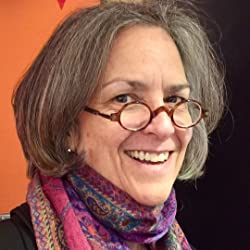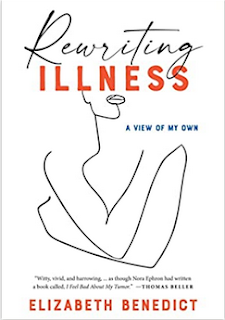Elizabeth Benedict is the author of the new memoir Rewriting Illness: A View of My Own, which focuses on her experience with cancer. Her many other books include the novel Almost, and her work has appeared in a variety of publications, including The New York Times. She lives in New York City.
Q: Why did you decide to write this memoir about your illness, and how was the book’s title chosen?
A: I’ll answer the easy question first. The title was offered by the publisher, and I loved it immediately. I had what seemed like 25 working titles for the book, or maybe only four or five. For the longest time I called it “The Girl Who Died,” because I’d been haunted by a girl in my senior class in high school who died of lymphoma.
Another working title, briefly, was “Nora, Susan and Me,” but that went nowhere fast—though reviewers have picked up on the role of these two women [Nora Ephron and Susan Sontag] in the book. I didn’t know either of them, but their lives as cancer patients and their work were both important to me.
And, as I say in the book, I was weirdly comforted by having ended up in the same hospital where Nora was treated and eventually died. It’s a dubious distinction, but to me it meant that I was getting the best care, Nora-level care, and I’d always feared that if I got sick—did I mention I’m a hypochondriac?—I wouldn’t have the resources to get that kind of care.
To the more complicated question: Why did I decide to write this memoir? One answer is how could I not have written about the ordeal? The story didn’t exactly fall into my lap—it burrowed its way into my armpit.
If I’d been diagnosed and treated right away, I wouldn’t have had a book. The extended time and drama it took to be diagnosed—even though I went to the doctor 12 hours after finding the lump–gave me stories, characters, and too many women doctors telling me my problem was my anxiety!
I had time to examine what I was going through as I forged my own path through the fragmented medical industrial complex. It was an opera of terror, medical mishaps, and interruptions for summer vacations. And I learned that doctors have their own language for telling us and not telling us what’s going on. It turned out there was a lot to write about, not just “I had cancer.”
Q: The Kirkus Review of the book called it “A fine antidote to anodyne cancer accounts.” What do you think of that description?
A: I’m thrilled that it stands out in this over-saturated “genre.” I was deeply reluctant to the write the book because I didn’t know how I could bring something original to it.
I had the voices of two friends warring in my head as I wrote. My friend Kate said, “You have to write this because it will help people going through it,” and my friend Bob, an editor for whom I write frequently, said, “I never want to read another cancer memoir!” I wanted to please both of them as they represented my views too.
I wrote the first many drafts in a straight narrative, this happened, then that happened. Serendipitously, a writer friend gave me an idea that turned the book around, which I wrote about in this essay, “On Writing (and Rewriting) Illness,” for The Millions.
When I was sick, I was very careful about what I read. Do I read books about people who survived or those who didn’t? I mostly avoided the latter.
I eventually screwed up my courage to read Jenny Diski’s memoir In Gratitude, about her terminal lung cancer, published in chapters in the London Review of Books. Writing about a terminal diagnosis is a different project from mine, but I also didn’t how things would turn out for a long time. In her book are brilliant comic riffs on death, dying, and writers. They gave me some courage as I wrote.
Q: Another assessment of the book, from author Roxana Robinson, called it “a lesson in how to live.” Do you see it that way, and what do you hope readers take away from the book?
A: Perhaps the book is a study in the examined life. I tried to understand my own fears and, for instance, my responsibilities to my husband while I was riddled with terror for months on end.
I thought about whom I would share my situation with and did not tell a good many people I was sick. I kept it hidden from everyone in my building, never mentioned anything on social media, and didn’t tell many people I’m close to. In the book, I try to understand what those gestures and silences meant to me. I try to hold myself accountable.
I examine how my terror kept me from asking questions of many doctors. And I write about going back to two of them a long time later and asking the questions I was too afraid to ask the first time around. Maybe these are lessons on how to live.
But to the extent they might be lessons, they’re for people who are exceptionally fortunate, those who have time to dwell on their circumstances as I did. I have a very supportive partner; I had jobs—writing and consulting—I could step away from without any penalty except the loss of income. I had health insurance and enough money to get better insurance when I feared I was sick.
I worried constantly about money because I had no idea how long the treatment would go on for and how much work I would lose. I wrote many letters in my head asking friends to contribute to a GoFundMe campaign. They got pretty elaborate, down to who would collect the money—me or my accountant. Fortunately, I never needed to send them.
I thought often of all the people who don’t have any of those things and are much sicker than I was. And people with small children to take care of. No one who gets cancer is lucky, but I knew I was lucky having those resources.
Q: In the book, as you mentioned, you refer to the writing of Nora Ephron and Susan Sontag. How would you compare your work to theirs?
A: The blurb on the front of the memoir, from Thomas Beller, says that the book reads “as though Nora Ephron had written a book called ‘I Feel Bad About My Tumor,’” which I’d like on my tombstone, though I hope it isn’t anytime soon.
There is a lot of humor in the book, interspersed with the terror—a lot of which revolves around me mocking my fears, my obsessions, and early reliance on “natural remedies” to shrink the lymph node, which included shots of wheat grass and jumping up and down hundreds of times.
I don’t have the audacity to compare my work to either of theirs, though I’m delighted that my humor evoked Nora. As I stumbled through my illness, I was more acutely aware of her decision not to tell people she was sick and how it related to my own silences.
For Sontag, I focused on her life as a cancer patient and her arguments in Illness as Metaphor, exploring whether the claim she made in 1978 still held, that describing cancer as a battle and a war kept people from seeking treatment. I’d known for many decades that when she learned she had cancer, she slept with the lights on. That became a touchstone for me: Would I sleep with the lights on too? (I didn’t.)
Q: What are you working on now?
A: I wish I had an interesting answer to this question! I’m promoting the book and gearing up to do my other job. For about six months a year, I help high school students apply to college, and that starts now.
And I’m taking notes for a few essays. One is a follow-up to a piece I just did for Salmagundi called “What’s the Matter with Sex?” about the end of what some people call ‘sex-positive feminism” and what internet porn has to do with it.
On a very different note, I’m also working on a piece about a chamber music concert I just attended. There were people sprinkled throughout the hall whom I’d known for 50 years and who had touched every part of my life profoundly. I think there’s something there to work with.
Q: Anything else we should know?
A: The prospect of having cancer is elementally terrifying, but the treatments for many are phenomenally effective. This is my intro to this public service announcement: get all the tests you’re afraid to get, stop smoking, and pay attention to your body. And if doctors tell you that anxiety is your problem, insist they look beyond it.
If all else fails, show them this article from The New York Times on medical gaslighting, which disproportionately affects women and people of color.
Thank you for asking!
--Interview with Deborah Kalb. Here's a previous Q&A with Elizabeth Benedict.


No comments:
Post a Comment